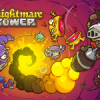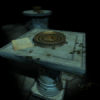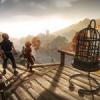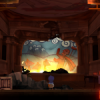Eldritch is a game that manages to combine the thick, oppressive dread of H. P. Lovecraft’s Cthulhu Mythos with the retro visuals of Minecraft while managing to sustain an identity all its own. Don’t make the mistake of dismissing the game as another Minecraft clone, though: Eldritch is a very different beast.
Released a few months back by Minor Key Games, a small 2-man studio, Eldritch is the brainchild of David Pittman, one of two brothers whose credentials extend to such esteemed titles as Borderlands and Bioshock. Pittman’s experience of working on both those titles can be felt here.
The game gets straight down to business – there’s no introductory cutscene and story is kept to a minimum, the lore of the world restricted to the occasional diary found lying about its procedurally-generated dungeons. Yep, we’re in a roguelike, but this isn’t quite like other roguelikes you’ve experienced before.
Gameplay consists of you navigating a series of dungeons, accessed through books found in the library where you start, and attempting to reach the end of each area so that you are able to escape. While the environment is destructible, opportunities to do so are rare; dynamite will blow a hole in walls or a mine pick might allow you to carve a path, but for the most part you’ll find yourself exploring the tunnels that already exist, tackling monsters (which increase in their ferocity as time moves on) and attempting to reach the end of each area, which is broken up between a number of different floors.
The game progresses through stages, with each book in the library introducing a subtle shift in the pacing of gameplay. The first area is simple, a mere teaser, while in the second zone a degree of stealth is necessary as you attempt to avoid the attentions of stone-clad lizards that are only too happy to attack you once your back is turned (fans of Doctor Who may well recognize some influence here). Each world’s dungeon has a series of floors which need to conquered before being able to move to the next, and you can return to the library to bank your gold and items in case you die.
The monsters themselves are fairly traditional Lovecraft fare, but hearing them scampering around the level will give you pause. A variety of cultists, floating eyeballs, frog-men and a giant blobby.. thing… can all be found, but for the most part they are easily dispatched – assuming they don’t kill you first. Although your character is vulnerable, crumpling after just a couple of hits, often you’ll find that your opponent will fall before you’ve taken even a single scratch so long as you find them first and have one of the game’s ranged weapons in hand. There’s no complicated system of parrying here; a hit is a hit, and evading is a simple case of moving out of range of your attacker.
Drinking from a fountain will temporarily extend your life by one heart, though they’re lost if you die. There are also statues to be found, dotted around the world, which furnish you with magical abilities – again, at least until you die. Cloak yourself so that your enemies can’t find you, run faster to evade your pursuers, or spawn blocks which help you to reach otherwise inaccessible places. The choice is yours, and the presence of these added abilities bring to mind the one-two pairing of weaponry and magic which Bioshock was so careful to cultivate, with spells being cast with the left hand while weapons are held in the right. You’ll also need to pay each time you cast a spell – in a clever twist of design, the game’s currency is also your magical ammunition, so you need to consider whether to save your funds in case a shop spawns in the world or make use of the magic that you currently have equipped. It’s a clever idea that brings another level of consideration to the proceedings.
Despite having some minor similarities, Eldritch isn’t quite capable of reaching the heights of Bioshock due to the simplicity of its combat, but the system works and does the job well, for the most part. The only unfortunate thing is that if you find yourself out of ammunition, it’s all too easy to accidentally throw your ranged weapons across the room. You’ll also want to be careful with how you handle dynamite, as it can easily rebound off your attacker or a nearby wall and land back at your feet, leading to a prompt – and rather embarrassing – death.
Speaking of death, for a rougelike Eldritch is fairly lenient with how it handles failure. Your character will simply awaken back in the Library, ready for another crack of the whip, with any items, magic or currency you’d been carrying at the time of your demise lost along with any additional health or equipment that you’d managed to acquire during your last trip. It’s not as harsh as it might sound though; items are plentiful and easily obtained through the course of normal play, and as you can only ever carry a small amount with you in the first place, it doesn’t feel as unforgiving as it would if you lost an entire stash of loot.
The game supports both keyboard and mouse or gamepad control and though both options work well, I found myself leaning more towards the latter. It isn’t a title that requires the pinpoint accuracy afforded by the use
of a mouse, so playing with a pad in hand is a perfectly viable option that won’t hinder your progress in any way, and the controls are simple enough that it never falls foul of the finger-contortions needed to play some other PC games with a controller.
The retro, almost cute visuals actually marry beautifully with the atmosphere that the title seeks to create. You’d be forgiven for thinking that the sense of quiet dread cultivated so well by Lovecraft would suffer under the circumstances, but if anything the need to use your imagination in order to fill in the gaps means that the game carries with it a sense of constant tension which can be genuinely unnerving at times.
The soundtrack helps to maintain that dread – sparse audio will have you jumping at the slightest sound, the unique moans of each creature type ensures that you tread carefully and the distinctive sound of footfalls will have you scrabbling for cover. It never reaches the heights of toe-curling fear that other Lovecraft-inspired games, such as Dark Corners of the Earth managed to cultivate, but it evokes a good amount of otherworldly horror and a similar sense of being trapped in a hostile and alien environment.
It’s a little on the easy side, admittedly – you won’t complete it in one sitting and the procedural generation ensures that you can return to a world you don’t recognize, but a lack of challenge ensures that it won’t be long before you see all the game has to offer. Upon completion you’ll unlock additional difficulty settings which ramp up the challenge, increasing the amount of monsters and the damage that they inflict, but a thin list of enemies and the repetition of a few basic structures means that you’ll quickly find yourself in the position where a degree of familiarity bleeds in to the experience.
It’s also short – this isn’t some epic experience that will see you through many a darkened evening, it’s a game that can be easily completed in just a couple of sessions. And unfortunately, despite the fact it is procedurally generated, you’ll quickly notice that structures have a tendency to repeat themselves; the lean nature of the game means that it’s easy to find yourself accustomed to all of its elements and inner workings within a few short hours.
One free expansion has been released so far. Mountains of Madness adds a new 10-level dungeon, a handful of new enemy types (deadly penguins!) as well as a few more weapons and powers. Hopefully more of these expansions will arrive over time and the game will grow into a title with a generous amount of content. It’s feels a little churlish to criticize the length of something which was made by one guy, but we feel it’s something that deserves to be mentioned. There are many ways in which it could be expanded on further of course and the core experience is wonderful, but it’s a title that needs a little more meat on its bones before it can truly stand tall among its contemporaries – some additional structures added to the list of level variables wouldn’t go amiss, for example.
Despite these few small niggles though, the game is never anything less than enjoyable throughout. Eldritch is a solid effort, a little light on long-lasting content and reasons to return to it but a game that certainly isn’t short on atmosphere. While it lasts it’s a very enjoyable title and comes highly recommended.








